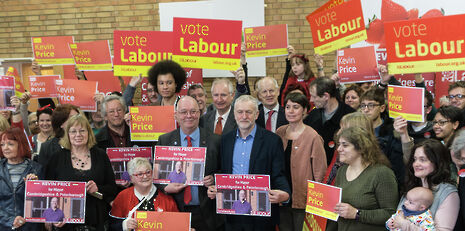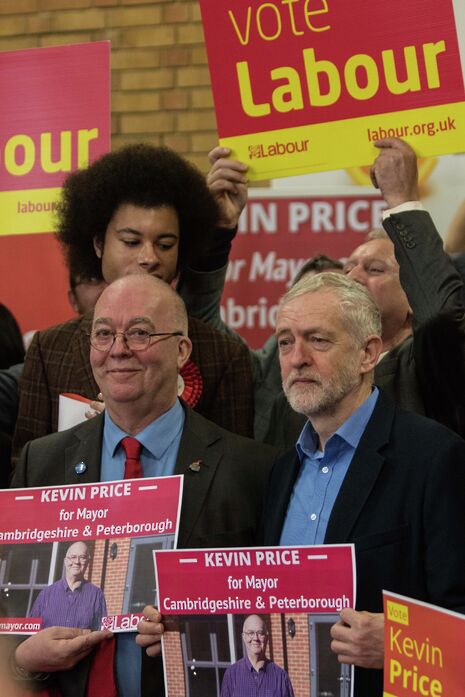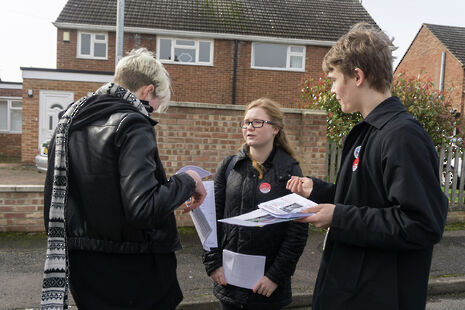Jeremy Corbyn comes to Cambridge
Caitlin Smith reports on the Labour leader’s visit with CULC to Chesterton as campaigning proceeds in the Cambridgeshire and Peterborough mayoral election

CHESTERTON – Ten minutes out of Cambridge city centre, on the road to Chesterton, nondescript suburban streets rolled past the taxi window. The driver, curious about what could entice a group of students away from the infamous ‘Cambridge bubble’ on a Saturday morning, asked about our destination. A look of bemusement crossed his face when informed that the students in the back of his taxi were in fact members of Cambridge Universities Labour Club (CULC), attending a Labour party canvassing event. Bemusement turned to wry humour when it emerged that the star attraction was to be none other than Jeremy Corbyn himself.
The event had been organised in advance of the forthcoming Cambridgeshire County Council election, to be held on the 4th May. The election will decide who becomes the inaugural Cambridgeshire and Peterborough Mayor, a position which will have responsibility for millions of pounds of funding, but on Saturday, despite the official purpose of the event, the election was firmly relegated to second fiddle.
The meeting, held in a primary school assembly hall, proved a marked contrast to the media coverage of similar events held in the early stages of Corbyn’s ascendency. Hordes bearing angrily-brandished placards were replaced by a few neat rows of plastic chairs. The demographic of his supporters had changed too, now comprising a fairly even age distribution. In fact, the contingent from CULC was only roughly twenty strong. No students attended from Anglia Ruskin University (ARU), despite the fact that CULC is meant to represent both universities. I asked their Press Officer, Luke Heppenstall-West, about this disparity. “There’s a big contingent of ARU students who are Labour members. We're excited whenever any ARU students come along. We’d encourage them to come along more.”

Corbyn’s address to his assembled supporters turned largely on what you would expect from the opposition leader: stirring calls to use the council elections as a “springboard for change” in order to tackle the “real housing crisis” which exists in the city. Labour, Corbyn said, is “prepared to invest and to build” where the Tories aren’t following “consistent underfunding of the NHS and local government.” He touched also on broader national issues, citing Labour’s defeat of a statutory instrument the Conservatives had “sneaked” into Parliament the previous day, The legislation would have meant that young people aged 18 to 21 applying for Universal Credit would not have been eligible to also apply for housing benefit, unless they could prove they were at risk in their own home.
After his speech, before he was whisked away to a London demonstration, I found myself not ten feet away from the man himself, and took the opportunity to sound out his thoughts on student political engagement. Beneath the standard campaign promises of tackling student debt and “a return to maintenance grants for university students” could be detected a genuine worry about young disaffection. “In the last election, only half of young people under 25 voted of those that had registered to vote. We want to drive that figure up, both registration and participation in the election.”
Voter registration was also a feature of my conversation with the Labour MP for Cambridge, Daniel Zeichner. He emphasised that “these elections will have a very direct impact, not just on your generation, but the ones coming on behind.” Students, on the other hand, seem reluctant to take action which might influence this impact. Despite “an absolutely fantastic level of engagement,” he mused, “what I would say we’re struggling with at the moment is people not always being registered to vote.” He continued, ‘[registration] is something which is very easy to do, can be done on the phone, and only takes a second, but really what’s disappointing is when people come to me on election day and say they want to vote but find they can’t.”
Canvassing later on in empty rows of terraced houses, I was struck by an uncomfortable sense of incongruity. Most of the residents seem willing to greet with civility (if not a little confusion) the students who interrupt their Saturday morning rituals bearing eager smiles, ‘I’m voting Labour’ stickers and well-to-do London accents. Josh Jackson, who is among other roles NUS delegate, CUSU University Councillor candidate, and eighteenth biggest BNOC, also holds a position on CULC’s Executive Committee, and stressed the positive impact of student political activism: campaigning “gives a real perspective; you can spend you entire life as a student in Cambridge just within the centre, but actually campaigning gets you out dealing with real world issues.” However, even he was not unaware of the difficulties faced by students trying to reach beyond the Cambridge bubble: as he put it, “You get to meet real people when you're out doing it” - but only “sometimes”.

I couldn't shake the sense that, however well-meaning, the efforts of Jackson and his fellow canvassers have not been wholly successful in broaching the infamous ‘town and gown’ divide. Even Corbyn had, in his speech, named Cambridge as a city of “different lifestyles and experiences.” On the doorstop, the canvassers’ emphasis on housing seemed to jar given that most of these students are guaranteed accommodation in their colleges for the duration of their degree. Nor are conversations on Zeichner’s pet topic of bus services - he is Shadow Transport Minister in Corbyn’s team - best conducted by students whose entire lives are confined to a bubble extending across perhaps a ten-minute cycle ride.
The day ended, predictably, with another taxi journey; the steadily increasing figure on the fare meter perhaps a fitting metaphor for the gulf that is the town and gown dichotomy. Terraced houses gave way to sunlit spires as the driver explained why, as a former Labour voter, he had recently turned away from the party: the familiar narrative of an unelectable leader hamstrung by rebellious MPs. In Chesterton, despite their enthusiasm and upbeat determination, it is the number of students that turned out to meet him which betrayed the fact these fears have penetrated the very core of Corbyn’s support. Of course, not every student is willing to get a taxi out of town in the middle of term for the sake of any politician, but the passion of students once formed the crest of the wave on which Corbyn swept to power. After yesterday morning, he may be wondering if that euphoria is still there
 News / Fitz students face ‘massive invasion of privacy’ over messy rooms23 April 2024
News / Fitz students face ‘massive invasion of privacy’ over messy rooms23 April 2024 News / Cambridge University disables comments following Passover post backlash 24 April 2024
News / Cambridge University disables comments following Passover post backlash 24 April 2024 Comment / Gown vs town? Local investment plans must remember Cambridge is not just a university24 April 2024
Comment / Gown vs town? Local investment plans must remember Cambridge is not just a university24 April 2024 Interviews / Gender Agenda on building feminist solidarity in Cambridge24 April 2024
Interviews / Gender Agenda on building feminist solidarity in Cambridge24 April 2024 Comment / Does Lucy Cavendish need a billionaire bailout?22 April 2024
Comment / Does Lucy Cavendish need a billionaire bailout?22 April 2024





